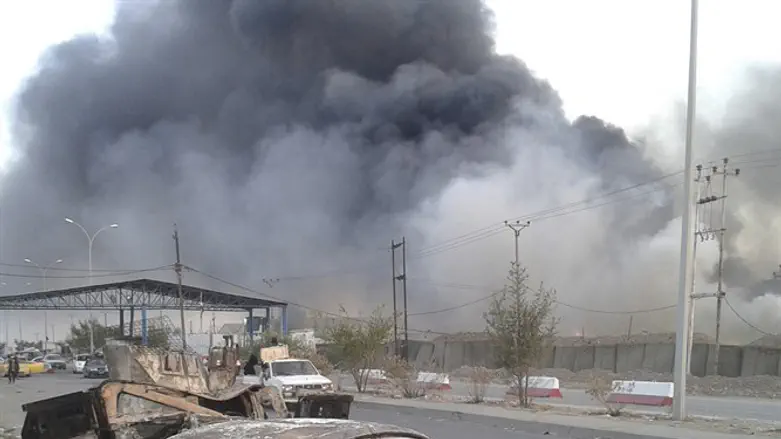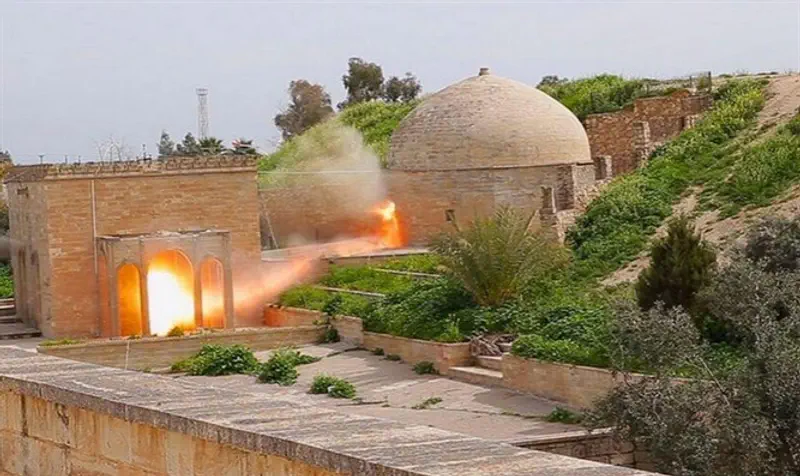
While the international media focuses on Israel’s new activities in Iraq where the IAF reportedly again bombed a base staffed by Iranians and members of the al-Hashd al-Shaabi militias and prevented the delivery of new ballistic missiles to the Shiite-dominated organization, someone else is trying to plunge the battered country into a new abyss.
Iraqi intelligence and the United Nations have reported that ISIS is working on a comeback led by the Jihadist organization’s leader Abu Bakr al-Baghdadi.

The Iraqi intelligence group Falcons Cell reported on Monday that al-Baghdadi is overseeing the transformation of ISIS into a guerrilla force and is adjusting the modus operandi of the terror group.
Falcons Cell chief Abu Ali al-Basr revealed that al-Baghdadi is suffering “from paralysis in his limbs due to shrapnel wounds in the spine. “
“This injury was sustained during an attack led by the Falcons Cell and the air force, in a south-eastern Hajin area in Deir ez-Zor before its liberation in 2018,” according to al-Basr
The ISIS leader is hiding in Iraq and not Syria according to the UN, as was reported by al-Basr.
“The epicenter for the terror group's budding renaissance is Iraq, where Abu Bakr al-Baghdadi and most of the ISIL leadership are now based,” a new UN report said.
The UN essentially confirmed what American intelligence officials and the Institute for the Study of War have said for some time now.
An ISIS re-emergence "could be faster and even more devastating" ISW wrote in a recent report.
The ISW report revealed that ISIS is categorizing all of its global operations as part of a campaign called “Soldiers Harvest”.
The campaign entails next to recruiting new members the regrouping of forces in Syria and Iraq where ISIS has some 30,000 fighters at its disposal and the expansion of operations to countries outside the Middle East, according to the think tank.
The UN Security Council now fears that in light of the worsening living conditions in Iraq where millions of people have been displaced and where a large part of the population is dependent on humanitarian aid “local populations will become impatient, blame the authorities and grow nostalgic for the time when ISIL was in control."
If we take a look at events which took place over the past few weeks we will see that the concerns are justified.
The Anti-War blog keeps track of terror attacks and other security-related events in Iraq and publishes a daily round-up of these attacks.
Tens of people die daily in Iraq as a result of ISIS’ actions and the Iraqi security services aided by the Iranian-backed al-Hashd al-Shaabi organization of mostly Shiite paramilitary militias have embarked on a counter-offensive.
At the beginning of July Jerusalem Post analyst Seth Franzman reported that the Iraqi army together with al-Hashd al-Shaabi had started another large-scale offensive against ISIS (sleeper?) cells in Iraq.
The offensive is called “Will of Victory” but a few weeks into the operation it has become clear that the Iranian-backed forces are still far from achieving this victory.
On an average day ISIS in Iraq carries out at least four deadly terror attacks with IED’s, mortars, car- and motorcycle bombs, drive-by shootings and suicide bombings.
The Iraqi security forces and al-Hashd al-Shaabi target ISIS every day and recently used warplanes to blow-up a secret terror tunnel in the western Anbar Province killing four ISIS terrorists.
The same happened in Mosul on Monday when Iraqi soldiers blew up a large terror tunnel built by ISIS and used to get its members in and out of the city.
The Iraqi anti-ISIS coalition tries to purge the desert areas in Anbar and Al Rutbah of ISIS members but thus far has not succeeded in stamping out the activities of the Islamic State group in these areas.
ISIS in Iraq is also trying to take over oil fields and on Sunday evening tried to storm the Olas oilfield in Salahuddin north of the capital Baghdad.
It was the third attack on the oilfield, protected by a police unit. Earlier ISIS tried to take over oilfields in the autonomous Kurdistan region with car and motorcycle bombs.
The wealth of the organization is an estimated $50 to 300 million, far less than, for example, Hezbollah which until 2018 had an annual income of $1.1 billion. That is the reason ISIS is trying to retake oilfields in both Syria and Iraq.
ISIS in Iraq is also pursuing a scorch the earth policy which has already aggravated an already dire humanitarian crisis. Many farmers have seen their crops destroyed by the Jihadists.
Operation ‘Will of Victory’ entered its second phase when the Iraqi army and al-Hashd al-Shaabi started to ‘cleanse’ villages north of Baghdad on Sunday.
This is all taking place while the Turkish army is conducting a large military operation against the outlawed Kurdish PKK movement which has a presence in northern Iraq.
The Turkish air force is launching deadly attacks on PKK positions in the Kurdish autonomous region in northern Iraq and last week killed 34 Kurds in three days of airstrikes.
The Turkish defense ministry said its military had ‘neutralized’ 255 PKK members since May 27 this year when the offensive against the PKK in Iraq started.
After three deccennia of war Iraq seems still light years away from stabilization, peace and prosperity.
